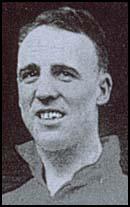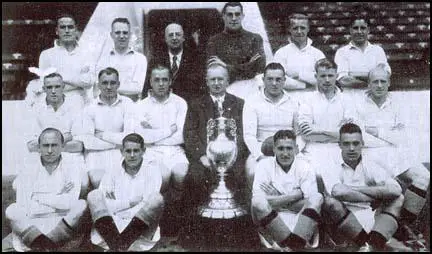Billy Dale

William (Billy) Dale was born in Manchester on 17th February 1905. He played local football for Sandbach Ramblers and Marple before he signed for Manchester United in April 1925.
Dale did not make his Football League debut until 25th August 1928. He found it difficult to obtain a regular place in the first team and after playing only 64 games he joined Manchester City in December 1931. He quickly established himself at the club and was ever-present at left-back for the rest of the 1931-32 season.
Wilf Wild became the manager of Manchester City on 14th March 1932. That season the club could only finish 14th in the league. However, they enjoyed a good FA Cup run. Fred Tilson scored a hat-trick in City's 9-0 victory over Gateshead. Eric Brook scored both goals against Walsall (2-0) and a hat-trick against Bolton Wanderers (4-2). Tilson scored against Burnley (1-0) and Derby County (3-2) and Manchester City had reached the final at Wembley. The Everton team that day included players such as Dixie Dean, Cliff Britton, Ted Sager and Albert Geldard. With Tilson missing because of injury, City lost the game 3-0.
In the 1933-34 season Manchester City finished 5th in the First Division of the Football League. The top four goal scorers that year were Alec Herd (17), Fred Tilson (12), Eric Brook (8) and Ernie Toseland (6).
The club also enjoyed a good FA Cup run beating Blackburn Rovers (3-1), Hull City (4-1), Sheffield Wednesday (2-0), Stoke City (1-0), Aston Villa (6-1) to reach the final against Portsmouth. On the way to Wembley the goals had been scored by Fred Tilson (7), Alec Herd (4), Ernie Toseland (4) and Eric Brook (3). The defence, that included players such as Billy Dale, Frank Swift, Sam Cowan, Jackie Bray and Matt Busby, also performed well.
Manchester City played Portsmouth in the final at Wembley. Fred Tilson had such a terrible injury record that when Sam Cowan introduced him to George VI before the game, he said: "This is Tilson, your Majesty. He's playing today with two broken legs." It was a good job that Tilson did play as he scored both of the goals in the 2-1 victory to increase his total to nine in eight cup games that season. Frank Swift, City's young goalkeeper, was so overcome by the achievement that he fainted at the final whistle.
In April 1934 Wilf Wild signed Sam Barkas from Bradford City for a fee of £5,000. A stylish right-back, Barkas had the ability to "create positive-play from defensive positions". He joined a team that included Billy Dale, Frank Swift, Sam Cowan, Jackie Bray, Matt Busby, Fred Tilson, Alec Herd, Ernie Toseland and Eric Brook.
By this time "Billy Dale was considered to be one of the best uncapped full-backs of his day; cool and stylish, quick in recovery and cultured in distribution." Manchester City was now seen as the club most likely to challenge the dominance of the Arsenal side that had won the league titles in the 1932-33, 1933-34 and 1934-35 seasons.
In February 1936 Wilf Wild purchased Peter Doherty from Blackpool, for a club record fee of £10,000. He joined a forward-line that included Eric Brook, Alec Herd, Fred Tilson and Ernie Toseland. By the end of 1936 Manchester City had obtained 23 points out of a possible 44. As Gary James points out in Manchester City: The Complete Record: "It was still not Championship form, but enough to give them a foundation to build on. The New Year saw City climb up the table and, by the time of their meeting with the usual dominant Arsenal in April 1937, the two sides occupied the top two positions." A crowd of 74,918 watched Doherty and Toseland score the goals that gave City a 2-0 victory.
Over the next three weeks Manchester City went on to beat Sunderland (3-1), Preston North End (5-2) and Sheffield Wednesday (4-1). City could only draw their last game 2-2 but by this time had been crowned champions. City scored 107 goals in the 1936-37 season, the main contributors being Peter Doherty (30), Eric Brook (20), Alec Herd (17), Fred Tilson (15) and Ernie Toseland (7). The defence, that included Billy Dale, Frank Swift, Jackie Bray and Sam Barkas, also did well that season, only letting in 61 goals in 42 games.

Dale was sold to Ipswich Town on 21st June 1938. During his time at Manchester City he played in 269 cup and league games. Dale's career was brought to an end by the outbreak of the Second World War.
William Dale died in 1987.
